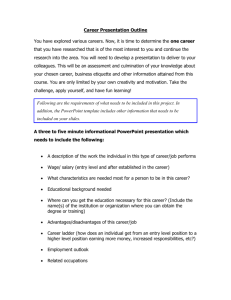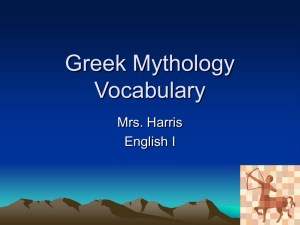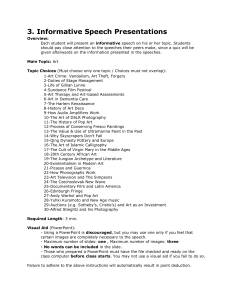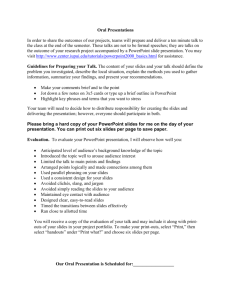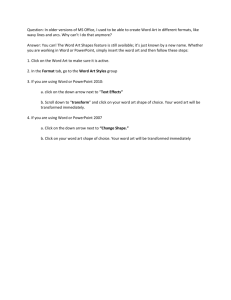Online Course Module Outline: Quality Matters Standards
advertisement
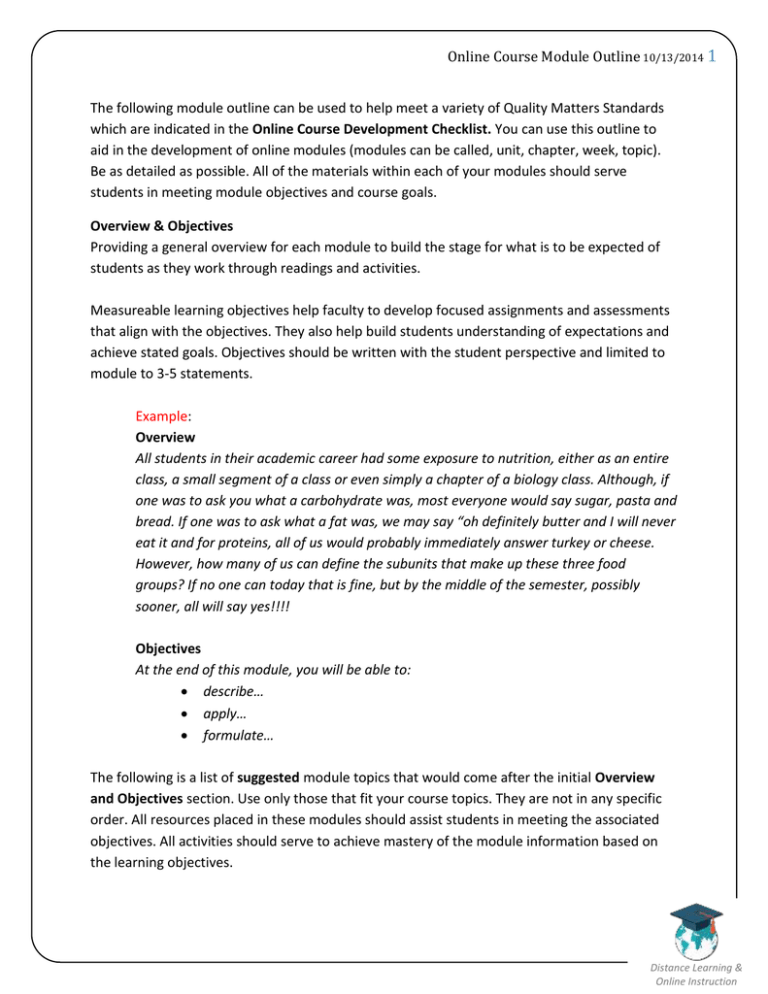
Online Course Module Outline 10/13/2014 1 The following module outline can be used to help meet a variety of Quality Matters Standards which are indicated in the Online Course Development Checklist. You can use this outline to aid in the development of online modules (modules can be called, unit, chapter, week, topic). Be as detailed as possible. All of the materials within each of your modules should serve students in meeting module objectives and course goals. Overview & Objectives Providing a general overview for each module to build the stage for what is to be expected of students as they work through readings and activities. Measureable learning objectives help faculty to develop focused assignments and assessments that align with the objectives. They also help build students understanding of expectations and achieve stated goals. Objectives should be written with the student perspective and limited to module to 3-5 statements. Example: Overview All students in their academic career had some exposure to nutrition, either as an entire class, a small segment of a class or even simply a chapter of a biology class. Although, if one was to ask you what a carbohydrate was, most everyone would say sugar, pasta and bread. If one was to ask what a fat was, we may say “oh definitely butter and I will never eat it and for proteins, all of us would probably immediately answer turkey or cheese. However, how many of us can define the subunits that make up these three food groups? If no one can today that is fine, but by the middle of the semester, possibly sooner, all will say yes!!!! Objectives At the end of this module, you will be able to: describe… apply… formulate… The following is a list of suggested module topics that would come after the initial Overview and Objectives section. Use only those that fit your course topics. They are not in any specific order. All resources placed in these modules should assist students in meeting the associated objectives. All activities should serve to achieve mastery of the module information based on the learning objectives. Distance Learning & Online Instruction Online Course Module Outline 10/13/2014 2 Pre-test/Post-tests Pre- and post- assessments help faculty understand gaps in student knowledge prior to learning and identify what has been gained from working through content. As an added benefit, students receive a nice preview of what is to be learned and assists them to focus on key topics. Keep in mind your pre-test could be as simple as a question or two pulled from the end of chapter test. The chapter test presented at end of the module would act as the post-test. Readings List all required readings for the module. Indicate the following: title author pages Presentations Presentations can be live, video or PowerPoint based. If it is a video presentation make sure it is recorded in small 10 to 15 minute chunks and streamed (as opposed to a media file uploaded to the content area of the course). If it is a PowerPoint, make sure the file size is small, anything over 5-6 megabytes will take longer downloading time. *please contact Linda.McConnell@brazosport.edu for assistance and/or questions If you are having a "live" presentation using the Online Room tool, do the following: Indicate the day and time Provide a link for students to prepare their browser for the meeting ahead of time Provide link to any handouts or powerpoint notes that can be used during the presentation If you are showing a video presentation, do the following: break video into 10-15 minute chunks provide a document or video transcript of the presentation provide a copy of the handouts or Powerpoint used in the video provide a video troubleshooting guide in case students have playback issues If you are linking a PowerPoint presentation, do the following: add an audio recording to the PowerPoint which will better explain the content on each slide make sure to "compress" the PowerPoint into a smaller file size Distance Learning & Online Instruction Online Course Module Outline 10/13/2014 3 create a link to a PowerPoint viewer (Microsoft.com) or OpenOffice software (openoffice.org), both of which are free and allow students to view the presentation without having to have Microsoft Powerpoint installed. indicate the size of the PowerPoint file Discussions Discussion questions should be based on topics discussed in the chapter only and should include the following: step by step directions for the discussion example of the type of response you are looking for (if applicable) a discussion rubric (what is your grading based on) specific question(s) link to specific discussion forum link to discussion help manual on how to work with discussions due date Assignment step by step directions for the assignment how the assignment will be submitted (discussions, email, dropbox) desired format of the assignment (pdf, word document, powerpoint, video) length and formatting of the assignment assignment examples (if applicable) an assignment rubric (what are you grading on) link to specific discussion or dropbox for the assignment submission link to discussion or dropbox help manual on how to work with discussions or dropbox due date assignment points policy for late submissions Exam/Quiz Exam/Quiz questions should be based on chapter content and information on this section should include the following: exam format (T/F, mulitiple-choice, essay, etc) point value timed? how many times it can be taken (2, 3, unlimited) Distance Learning & Online Instruction Online Course Module Outline 10/13/2014 4 what will be covered in the exam is it proctored? link to exam link to quiz help manual on how to work with quizzes if it is an essay exam, indicate when students can view their grade indicate if students can view their grade upon submission or not, if not indicate when grades will be viewable Resources (*this could be a standalone module, containing resources for the entire course) Provide any additional readings, websites, documents, media, etc., which are NOT required but can be used for research or a deeper understanding of module or course content. Single Module structure Example: Chapter 1 Pre-test Overview & Objectives Readings Presentation Discussions Assignment Chapter 1 Exam (post-test) Resources Distance Learning & Online Instruction
